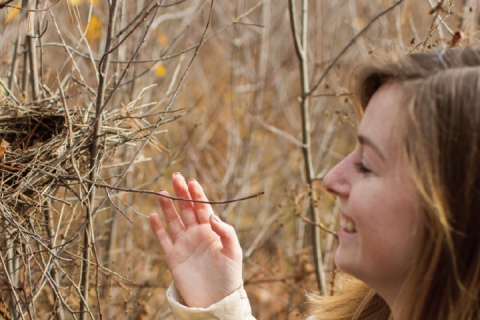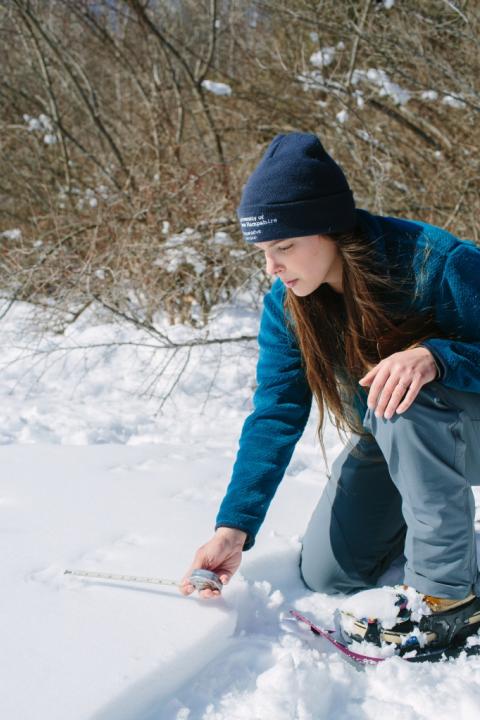
Discover New Hampshire’s Wildlife & Habitats
From the peaks of the White Mountains to the Atlantic coastline, from our backyards to the backcountry, New Hampshire is home to a great diversity of wildlife species. Get involved in the Speaking for Wildlife program, either as a volunteer speaker or host a talk, and learn about wildlife species and their habitats in the Granite State.
- Community groups
- libraries
- town boards
- and similiar groups
COVID-19 Information: As of March 2022, the Speaking for Wildlife program has resumed in-person presentations. We request that groups hosting a Speaking for Wildlife presentation follow current CDC COVID-19 guidelines. Social distancing should be maintained to the extent it is possible, and attendees should be encouraged to stay home if they have COVID-19 symptoms or have any recent potential exposure. Facemasks are not currently required during indoor presentations, per recommendations of the CDC and updated UNH policies. However, mask wearing is welcome for those who feel more comfortable and UNH continues to encourage all who are able to be fully vaccinated to reduce the spread and impact of COVID-19.
Reptiles & Amphibians
Title of Presentation: Reptiles & Amphibians: Warming Up to New Hamphsire's Cold-Blooded Natives
The Reptiles & Amphibians slide presentation introduces participants to the frogs, salamanders, turtles and snakes that call New Hampshire home. These species range from among the most common animals in the state, to some of the rarest. You’ll learn about the many different habitats that reptiles and amphibians use, what threats they face, and what you can do to help. Presentation includes handouts and other helpful materials. Program length: 1 hour, including time for discussion
A presentation narrated by Kathy Schillemat, a Speaking for Wildlife, NH Coverts Project and Salamander Crossing Brigade volunteer for the Harris Center for Conservation Education.
RESOURCES
Reptiles & Amphibians: Warming Up New Hampshire's Cold-Blooded Natives Presentation [script]
New Hampshire Bats
Title of Presentation: New Hampshire Bats and White Nose Syndrome
Bats have been in the news lately. Wondering what’s up with bats in New Hampshire? This talk will give you an overview of the different kinds of bats found in our state, where to look for them, and how landowners and homeowners can help conserve these fascinating mammals. You’ll also learn about the impact of white-nose syndrome on our bats in New Hampshire, what scientists are learning about this threat, and how you can help. Program length: 1 hour, including time for discussion
Poster showing all of the bats of NH
Laminated "cheat sheet" with facts of all NH bats (size, good preferences, etc.)
Handout about White-nose Syndrome from NH Fish and Game
Latest Map of Spread of White-nose Syndrome
Critierial for Successful Bat Houses - Dos and Don'ts from Bat Conservation International
RESOURCES
Criteria for Successful Bat Houses (links to http://www.batcon.org)
Map of Spread of White-nose Syndrome (May 2017)
White-nose Syndrome is Killing Our Bats (.pdf download from NH Fish and Game Department
NH Big Three
NHBugs: The Big Three informs New Hampshire citizens and visitors about three invasive insects of greatest concern to our trees and forests: emerald ash borer, hemlock woolly adelgid and Asian longhorned beetle. This presentation includes information about the life cycles, identifying signs and symptoms of infestations, and management techniques for each pest. Program length: 1 hour, including time for discussion
Does not include current information about emerald ash borer infestations.
RESOURCES
NHBugs: The Big Three Presentation [script]
NHBugs: The Big Three Press Release
Emerald Ash Borer (EAB) ID Sheet
NHBugs: The Big Three - Recommendations for Landowners Handout
NHBugs: The Big Three Sample Promotional Flyer
Landscape Trees and Their Susceptibility to Invasive Insects
Bird, Bats & Buttterflies
The Birds, Bats & Butterflies slide presentation highlights a dozen wildlife species commonly seen in New Hampshire. Participants will learn cool animal facts and find out about how the diverse mix of habitats in our region support species such as American woodcock, painted turtle, pileated woodpecker, wood frogs, little brown bats and other captivating creatures. Presentation includes handouts and other helpful materials. Program length: 1 hour, including time for discussion
The Dozen Wildlife Species: Yellow warbler, red fox, black bear, monarch butterfly, American woodcock, little & big brown bat, moose & deer, red-backed salamander, painted turtle, wood frog, Cooper's hawk, pileated woodpecker.
This presentation has been updated since the recording of this video; some information and visuals will differ.
RESOURCES
Birds, Bats & Butterflies [script]
For the Birds: Bird Feeding Tips
A Garden for Wildlife
Title of Presentation: A Garden for Wildlife: Natural Landscaping for a Better Backyard
A Garden for Wildlife is a slide presentation that shows how anyone with a backyard, garden, or landscaped area can help wildlife by altering their landscaping and gardening practices. Includes discussion of wildlife and habitats, plant choice, use of native plants, nest boxes and feeders, and issues such as invasive plants. Program length: 1 hour, including time for discussion
This presentation has been updated since the recording of this video; some information and visuals will differ.
New Hampshire's Wild History
Title of Presentation: New Hampshire's Wild History: 350 Years of New Hampshire Wildlife
The Wild History slide presentation takes participants on a virtual journey through New Hampshire’s past, focusing on changes in the land and how wildlife populations have responded over time. You’ll learn why changes in habitat in our past are behind the decline of many of our rarest species today, and why others are more abundant than in the past. You’ll also learn what you can do to help. Presentation includes handouts and other helpful materials. Program length: 1 hour, including time for discussion
This presentation has been updated since the recording of this video; some information and visuals will differ.
RESOURCES
Speaking for Wildlife New Hampshire's Wild History
NH's Wild History Presentation [script]

